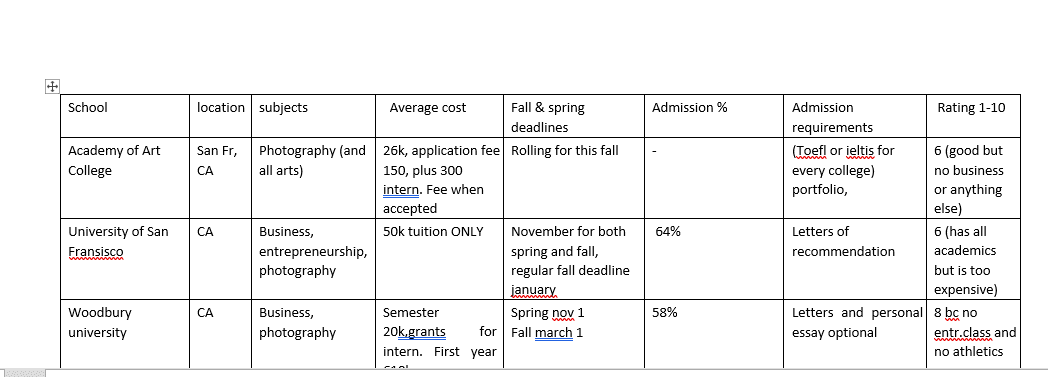
Welcome back! Today’s post is going to be all about: What is the right college for me?.
There are a few factors that go into your college decision, and knowing how to eliminate and choose wisely is key!
In this post, I will cover how to research colleges, what to look for in your schools, and what to do when more than one college accepts you!
Let’s get started.
How to choose the right college

Here is a video of my college decision!
Related posts:
- How to apply to college as an international student
- Alternatives to college
- 15 Tips for college move-in day
1. Know what you want from going to college
First, you need to figure out what you want to go to college for. It is 2020, and college isn’t something you necessarily need to be successful in life and your business unless you want to become a doctor, lawyer or another profession that requires a degree.
Whatever reasons you have, it helps to write it down.
So for me, the idea of going to college didn’t even come to my head before I finished with my online high school diploma. I was trying to figure out what to do after graduating, and I was going back and forth between traveling, learning about businesses and starting my own, or going to school.
I wanted to start my own business, and have already, but something is missing. Yes, it all comes with experience, but I figured it wouldn’t be a bad idea to actually learn about it.
So I decided that I wanted to study entrepreneurship.
Knowing why you want to go to college in the first place is crucial for choosing the right college for you!
2. Consider your major
Knowing what you want to study will help you a lot in your process of figuring out which colleges to apply to.
It is a different story if you are undecided, but knowing what you are interested in can help you eliminate certain schools.
Are you undecided? No problem. In your case, focus on the “why” you want to go to college for and find the schools that can give you that.
3. Private or Public?
The next question you can ask yourself is whether you want to go to a public or a private university. Public colleges are usually less expensive and large, while private schools are more expensive but have the advantage to be more hands-on and have great programs.
Tip: Create a Chart
To keep everything I find about colleges organized, I created a university chart on my laptop with the following things:
- Name of the University
- Public/ Private
- Location
- Name of favorite major/ major options
- Annual cost
- Deadlines
- Acceptance rate
- Admission requirements
- my personal rating + reason
Here is an example of how I structured my chart:

Based on my chart, where I collected approx. 15 schools, I crossed out every school below an 8-rating and kept about 5 schools I liked.
After that, you can research more about the school and if you think it’s a good fit, you can add it to your good-schools list, if you want to make one like that.
5. Programs?
If you love sports or really want to join Greek life, make sure you look for those criteria in your college research process.
6. Is location important?
You know best if it’s more important for you to study your dream subjects, be in a cool location, or have a mix of both.
Some universities are in the middle of a city but might not have the perfect program for you, while the college with your favorite program might not be at the location of your dreams. Be flexible and open-minded!
7. Research universities
Here comes the fun part! Research colleges with the help of knowing what to you want from it, its majors, size, location, and anything else.
If a college fits your criteria, write it into your chart!
8. Consider requirements and your stats
Colleges in the US can have pretty strict requirements when it comes to applications.
Make sure you look for universities that are in your league (considering your stats etc) but also apply to a school that you think might be too hard to get into. Who knows, maybe you’ll get in?
For the US, the typical requirements are:
- TOEFL test (English proficiency test)
- Final and official transcripts
- Your diploma
- SAT/ACT scores
- A minimum GPA
- Recommendation letters of your counselor, sometimes teachers too
If you go to a university in Europe, you probably won’t need your SAT scores, and not all schools in the US require SAT scores from international students, but as I said, that’s why we do research.
Make sure to be early enough, because taking those tests (including studying for them) and getting your scores delivered takes a lot of time.
To find out if there is a testing center for the SAT in your area, here is a code list for international students by CollegeBoard.
For the TOEFL test, which almost all English-teaching universities accept, you can look for your country here.
9. Have a budget
Tuition can get expensive, so make sure to have a budget where you look for colleges.
In my case, I was between two schools, a public, cheaper university, and a more expensive private one. Even if the cheaper school was good, it didn’t have the programs that I felt like would really help me with my goal. So, I chose the private university because of the return on investment.
I am not saying you should go into debt to go to college, but keep in mind that cheap isn’t always best!
If you need to work some more to pay your tuition, you can look for a job or do online side hustles to make money for your school.
I have a post with 15+ ideas to make money as a student and a free course how to start a blog and make money with it! Feel free to check those out if you’re looking for some jobs.
If you want to apply to scholarships to fund your education, you can use these scholarship sites to find scholarships you’re eligible for.
Here is a scholarship site for international scholarships.
10. What to do when you’re torn between 2 or more colleges?
First, enjoy the moments of getting your acceptance letters!
When you aren’t sure which acceptance offer to accept, write down the best and the worst things about each school and listen to your heart.
Imagine yourself at the college and think what you can accomplish with getting a degree from that college.
I promise you’ll have a more positive feeling for one school!
It can be hard to eliminate colleges you like, but it’s a necessary step in how to choose the right college.
I recommend to look up final information online, and maybe contact a few students who go there. You can do that through Instagram, Facebook, or ZeeMee.
Conclusion
These were my 10 tips for choosing the right college and hopefully the answer to your question: What is the right college for me?
All in one, make sure you know why you want to go to college and for what, and then choose your colleges according to that plus other criteria you have.
Not too hard, right?
Let me know if you need any help, and comment what schools you’re applying to!
Until soon,







Thinking about what you want out of your college experience can really help narrow down your search. Thank you for sharing your story!